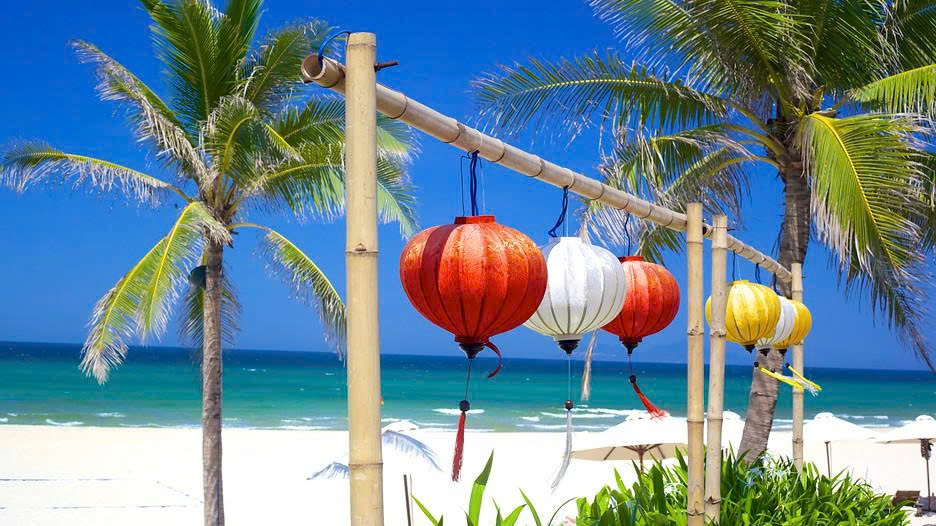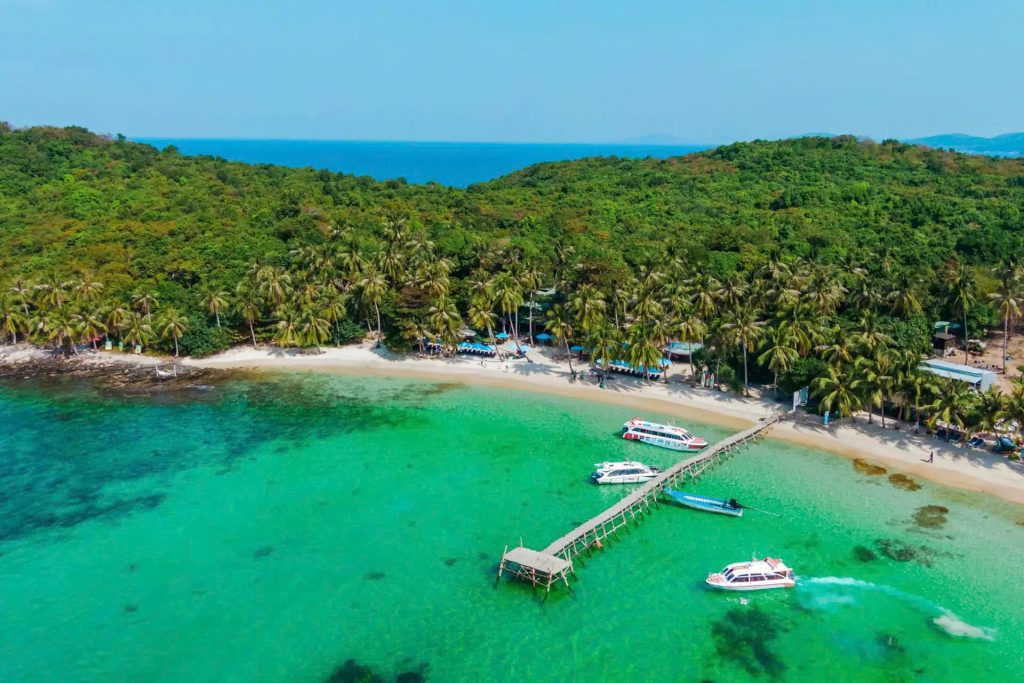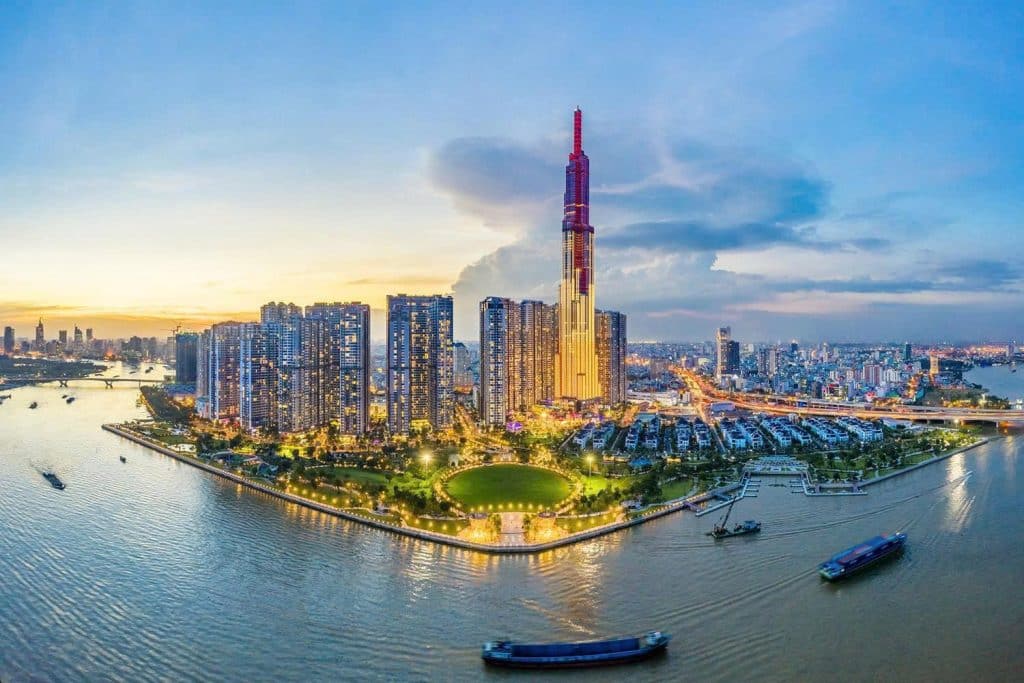Are you dreaming of trading your cubicle for a beachfront view, or swapping your daily commute for a stroll through ancient streets? The life of a Digital Nomad in Vietnam is more than just a dream—it’s an increasingly popular reality. Vietnam has rapidly emerged as a top destination for remote workers, offering a unique blend of vibrant culture, breathtaking landscapes, delicious cuisine, and an incredibly affordable cost of living.
This article will equip you with everything you need to know to successfully navigate your digital nomad journey in Vietnam, from choosing the perfect city to managing your finances, ensuring connectivity, and understanding local nuances. The dynamic energy and rich heritage of this Southeast Asian gem await.
1. Why Vietnam is a Global Magnet for the Digital Nomad in Vietnam
Vietnam’s appeal for remote workers and location-independent entrepreneurs is multi-faceted and compelling. It’s a country that offers a potent mix of professional productivity and adventurous exploration, making it a favorite for the global nomad community.
Unbeatable Affordability: Stretching Your Runway

Compared to Western countries and even some other popular Asian destinations (like Singapore or major Thai cities), the cost of living in Vietnam is remarkably low. This affordability is the single biggest draw for a Digital Nomad in Vietnam. It allows your savings and monthly income to stretch further, transforming a modest remote salary into a comfortable, even luxurious, lifestyle. You can enjoy high-quality services, comfortable housing, and world-class food without the financial stress common elsewhere.
A Tapestry of Vibrant Culture & Rich History
Vietnam offers an authentic and deep cultural immersion. From the thousand-year-old temples and imperial citadels in Hanoi to the wartime tunnels near Ho Chi Minh City, and the lantern-lit streets of Hoi An, there is history everywhere. The street life is a constant, engaging spectacle—bustling markets, sidewalk cafes, and the rhythmic flow of motorbikes provide a lively backdrop to daily work.
A Culinary Paradise: Delicious & Diverse Cuisine

Vietnamese food is globally celebrated and forms a core part of the nomad experience. It’s a food lover’s paradise, with endless options from street food stalls serving legendary Phở (beef noodle soup) or Bún chả (grilled pork with vermicelli) for a few dollars, to refined fine-dining experiences. The regional diversity in cuisine ensures you’ll never get bored—from the delicate, broth-based Northern flavors to the spicier, sweeter Southern dishes.
Thriving Digital Nomad Community
The influx of remote workers has created a supportive and rapidly growing network. In major cities, especially Ho Chi Minh City and Da Nang, you’ll find a vibrant ecosystem of like-minded individuals. This community is a vital resource for networking, making friends, sharing tips on visas and accommodation, and combating potential loneliness.
Stunning & Diverse Landscapes

Vietnam’s geography is a stunning canvas. It boasts beautiful beaches (Da Nang, Phu Quoc), dramatic mountains and rice terraces (Sapa, Ha Giang), serene rivers and deltas (Mekong Delta), and bustling, modern metropolises. Weekend trips offer unparalleled adventure, allowing you to easily switch from city life to natural tranquility.
Improving Infrastructure and Connectivity
Vietnam’s infrastructure is rapidly modernizing. Internet connectivity is generally excellent and affordable, with fiber-optic connections common in urban areas. The number of dedicated coworking spaces is consistently increasing, and power stability is reliable in major cities, supporting productive remote work.
2. Best Cities to Establish Your Base as a Digital Nomad in Vietnam
Choosing the right base is crucial for your long-term satisfaction and productivity. Vietnam’s main hubs each offer a distinct personality, catering to different styles of the Digital Nomad in Vietnam.
Ho Chi Minh City (HCMC) – The Bustling Metropolis (Saigon)
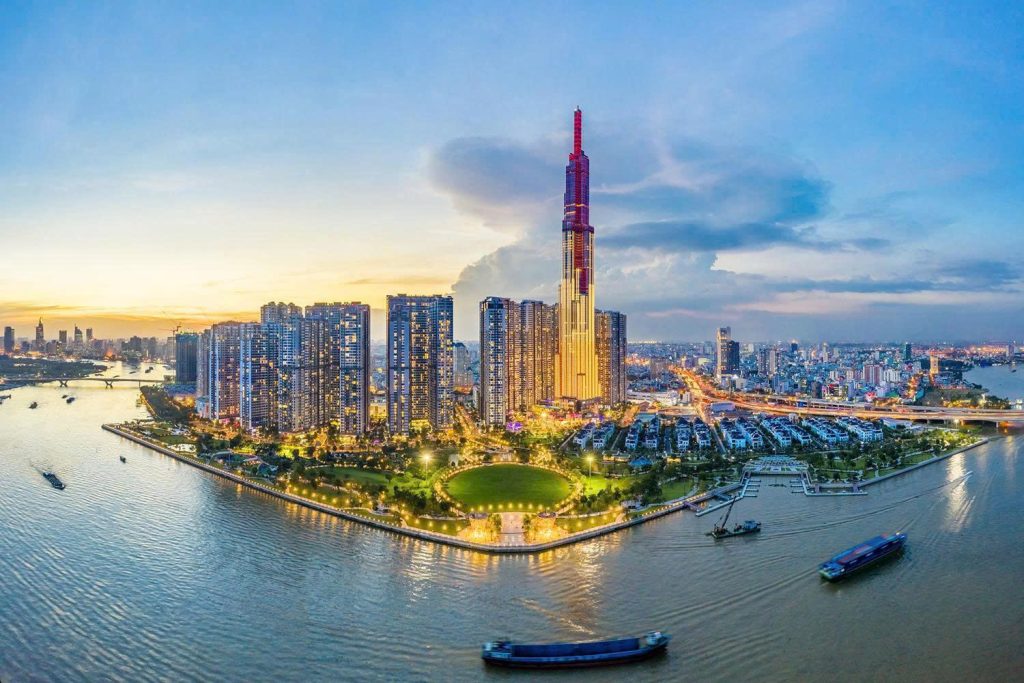
HCMC, still affectionately called Saigon by many, is the economic powerhouse of Vietnam and its largest city.
- Vibe: Energetic, fast-paced, modern, and cosmopolitan. It operates 24/7 with an unparalleled level of energy.
- Pros:
- Largest Digital Nomad Hub: HCMC hosts the most extensive and well-organized digital nomad community. District 2 (especially the Thảo Điền ward) and District 1 are the primary expat zones, offering a plethora of networking events, meetups, and international amenities.
- Endless Amenities: World-class dining (including every type of international cuisine), vibrant nightlife, sophisticated shopping malls, and excellent healthcare services.
- Excellent Connectivity: Highest density of reliable internet cafes, dedicated coworking spaces, and modern serviced apartments.
- Transportation: Efficient and affordable travel within the city via the ubiquitous ride-hailing apps, Grab and Gojek (motorbike taxis are the fastest way to navigate).
- Cons: Traffic can be intense and overwhelming, noise levels are high, and air quality can be a concern, especially in high-traffic periods.
- Estimated Monthly Cost (Mid-range): $700 – $1,200. This is the higher end for accommodation but the variety of cheap food keeps overall costs manageable.
RELATED: Ho Chi Minh City Digital Nomads Cost of Living
Hanoi – The Historic Capital

Hanoi, the nation’s capital, offers a deeper, more traditional Vietnamese experience rooted in history.
- Vibe: Ancient, charming, traditional, and more laid-back than HCMC, yet still bustling, especially around the atmospheric Old Quarter.
- Pros:
- Cultural Immersion: Easy access to cultural landmarks like the Hoan Kiem Lake, the Old Quarter’s ’36 Streets,’ and numerous museums and temples. You experience a profound sense of Vietnamese heritage.
- Beautiful Architecture: Stunning French colonial buildings and serene lakes create a picturesque, romantic setting that contrasts with the fast-paced modern life.
- Delicious Food Scene: Renowned for its unique Northern Vietnamese cuisine. This is the birthplace of Phở as most Westerners know it, and the only place to truly experience Bún chả (grilled pork patties served with vermicelli and dipping sauce).
- Strategic Location: It serves as the gateway to Northern Vietnam’s spectacular attractions like Halong Bay, Sapa (rice terraces), and the Ha Giang Loop.
- Cons: Colder, sometimes damp, winters require different packing. The digital nomad community is smaller and more dispersed than in HCMC.
- Estimated Monthly Cost (Mid-range): $600 – $1,000. Generally cheaper than HCMC for the same quality of accommodation.
RELATED: Ho Chi Minh City vs Hanoi for Digital Nomads: Which City is better for you
Da Nang – The Coastal Gem

Da Nang is Vietnam’s third-largest city and often hailed as its most “livable” urban center.
- Vibe: Relaxed, modern, clean, well-planned, and beachfront-oriented with easy access to nature. It perfectly balances city convenience with beach life.
- Pros:
- Beautiful Beaches: My Khe Beach and Non Nuoc Beach offer miles of golden sand, perfect for morning runs, relaxation, and water sports.
- Outdoor Activities: Close proximity to the stunning Marble Mountains, the Son Tra Peninsula (Monkey Mountain), and the breathtaking Hai Van Pass.
- Balanced Lifestyle: The traffic is noticeably lighter and less chaotic than in HCMC or Hanoi, making for a less stressful daily commute.
- Proximity to Hoi An: It’s just a 30-minute affordable ride to the UNESCO World Heritage ancient town of Hoi An, providing a perfect escape.
- Growing Nomad Scene: The community is rapidly expanding, with an increasing number of beachside cafes and dedicated coworking spaces.
- Cons: Can be extremely hot during the peak summer months (June-August). Nightlife is less diverse than HCMC.
- Estimated Monthly Cost (Mid-range): $500 – $900. It is often cited as offering the best value for money in Vietnam.
RELATED: Da Nang for Digital Nomads: The Coastal Remote Work Haven
Hoi An – The Ancient Town Charm
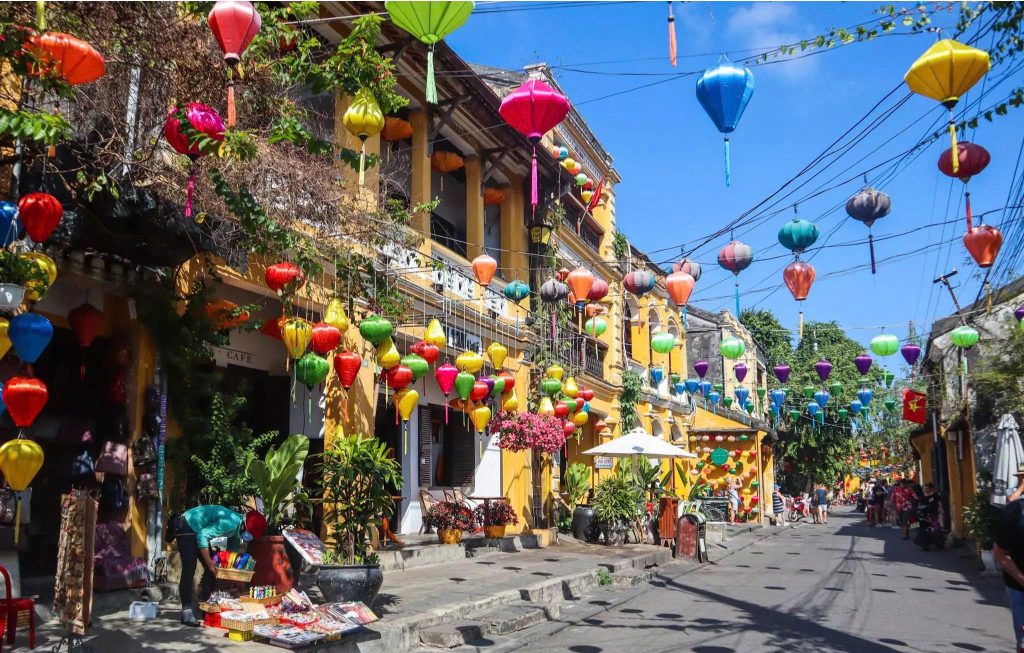
Just south of Da Nang, Hoi An offers a different pace entirely—ideal for a shorter, highly cultural stay.
- Vibe: Quaint, artistic, tranquil, and historically rich. A UNESCO World Heritage site centered on a beautifully preserved old town.
- Pros:
- Unique Atmosphere: Imagine working near lantern-lit streets, ancient houses, and the slow pace of life along the Thu Bồn River.
- Culinary Hotspot: Home to unique regional specialties like Cao Lầu and Mì Quảng, with excellent cooking classes available.
- Tailoring Capital: Famous for custom-made, high-quality clothing (suits, dresses) at very affordable prices.
- Good for Shorter Stays: Ideal for a 1-3 month immersive cultural experience before moving to a larger city.
- Cons: Gets very touristy, especially in the Old Town area. Limited, though growing, infrastructure for dedicated remote work (fewer coworking spaces). Can feel too small for long-term stays.
- Estimated Monthly Cost (Mid-range): $500 – $800.
3. Cost of Living for the Digital Nomad in Vietnam

The exceptional affordability is the main factor attracting the Digital Nomad in Vietnam. Here is a detailed breakdown of typical monthly expenses, estimated for 2026.
Accommodation: Your Single Biggest Expense
| Category | Description | Estimated Monthly Cost |
| Budget | Guesthouse private room, or a room in a shared expat house. | $200 – $400 |
| Mid-range (Standard Nomad) | Studio or 1-bedroom apartment (modern, outside city center, or local standard). | $400 – $700 |
| Mid-range (Prime Location) | 1-bedroom apartment (modern, in a prime expat district like HCMC D2 or Hanoi Tay Ho). | $600 – $1,000 |
| High-end Comfort | Serviced apartment (cleaning, security, gym, pool included) or modern condo. | $800 – $1,500+ |
Food: A Daily Pleasure

| Category | Description | Estimated Monthly Cost |
| Street Food/Local Restaurants | Phở, Bánh mì, Cơm tấm (broken rice) – 1-3 meals/day. | $150 – $300 |
| Mid-range Restaurants | Casual dining, delivery, or simple Western meals (e.g., pizza, burgers). | $300 – $500 |
| Groceries | Cooking at home, primarily local produce (can be much higher for imported goods). | $100 – $250 |
| Coffee/Drinks | Vietnamese cà phê sữa đá (iced coffee with condensed milk) is cheap; specialty cafes are slightly higher. | $50 – $100 |
Transportation: Getting Around
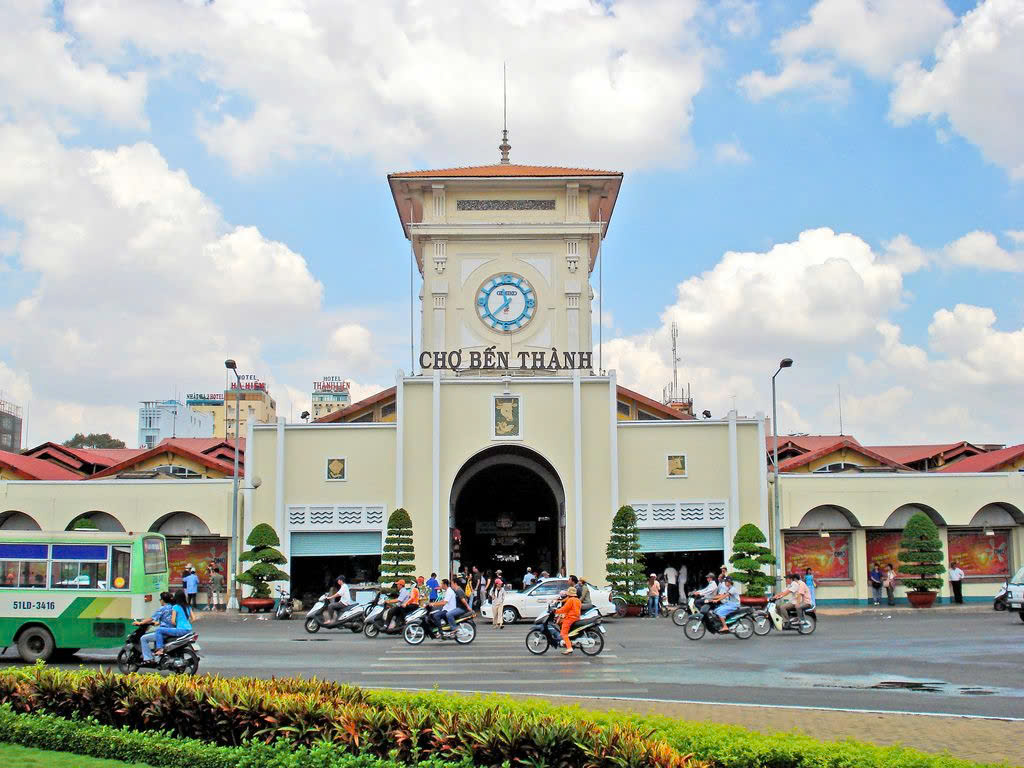
- Motorbike Rental (Monthly): $50 – $100 (for a semi-automatic or scooter).
- Ride-Hailing (Motorbike Taxi): GrabBike or Xanh SM is indispensable. $1 – $3 per ride (for local distances).
- Ride-Hailing (Car Taxi): $3 – $8 per ride.
- Inter-City Travel: Overnight sleeper buses or trains are very affordable, ranging from $15 – $40 for long journeys.
Work & Utilities
- Utilities (Electricity, Water, Gas): $50 – $100 (varies heavily based on A/C use, which is necessary).
- High-Speed Internet (Apartment): Often included in rent or $10 – $20/month.
- SIM Card & Data: $5 – $15 (unlimited data plans are common, cheap, and reliable).
- Coworking Space (Hot Desk): $50 – $150/month.
Estimated Total Monthly Budget

| Nomad Type | Description | Estimated Monthly Budget |
| Budget Nomad | Shared room/budget apartment, mostly street food, limited socializing. | $600 – $900 |
| Mid-range Nomad | Private, comfortable apartment, mix of local/Western food, regular socializing, some travel. | $900 – $1,500 |
| Comfort/High-end Nomad | Serviced apartment, frequently dining out, extensive travel, premium services. | $1,500+ |
4. Essential Infrastructure and Connectivity for the Digital Nomad in Vietnam
Reliable connectivity and a comfortable workspace are non-negotiables for the remote worker. Vietnam has significantly improved its digital infrastructure to meet this demand.
Internet & Mobile Data: Fast and Affordable
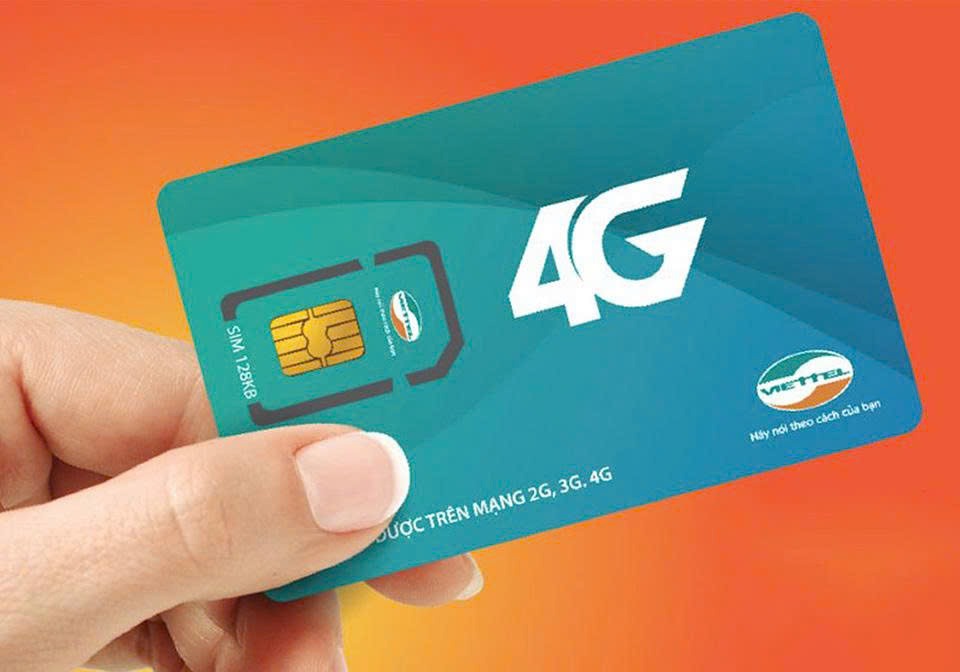
- Reliability: Fiber-optic internet is standard in apartments, cafes, and coworking spaces in all major cities. Speeds are generally excellent for video calls and uploads.
- Mobile Data: This is a vital backup. Upon arrival, secure a local SIM card from major providers like Viettel (widest coverage), Mobifone, or Vinaphone. Unlimited data plans are incredibly cheap (often $10–$15 per month) and provide excellent 4G/5G coverage across urban areas and even many remote locations.
- Workarounds: Occasional underwater cable issues can affect international speeds (rare, but it happens). A good VPN is essential, both for security and to access content/tools potentially blocked in the region.
Power & Office Setup
- Power Supply: Voltage is $220V$. Power outlets are typically a mix of Type A, C, and G, so an international adapter is recommended.
- Power Outages: While rare in major cities, they can happen during peak hours or in storms. A portable power bank for your devices or an Uninterruptible Power Supply (UPS) for a desktop setup is a smart investment for critical work.
- The Cafe Office: Vietnamese cafe culture is legendary. You’ll find countless air-conditioned cafes with strong, free Wi-Fi, making it easy to pop out for a few hours of focused work.
Coworking Spaces & Community Hubs
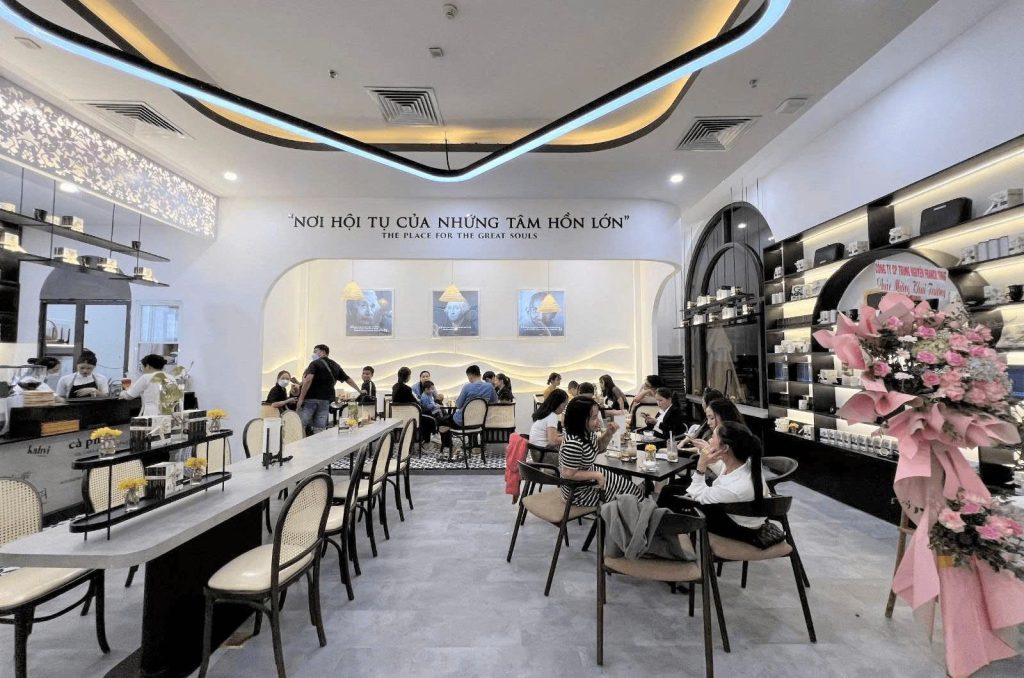
Major cities boast a rapidly expanding number of professional coworking spaces, which offer a great way to separate work and living, and, crucially, a way to network.
- Popular Chains: Toong (stylish, excellent locations), Dreamplex (modern, tech-focused), and numerous independent, unique spaces.
- Benefits: Reliable internet, ergonomic seating, meeting rooms, and built-in networking events are standard offerings.
5. Visa and Legal Realities for the Digital Nomad in Vietnam
This is the most critical logistical challenge for the Digital Nomad in Vietnam, as the country currently does not offer a dedicated digital nomad visa.
The Current Visa Landscape
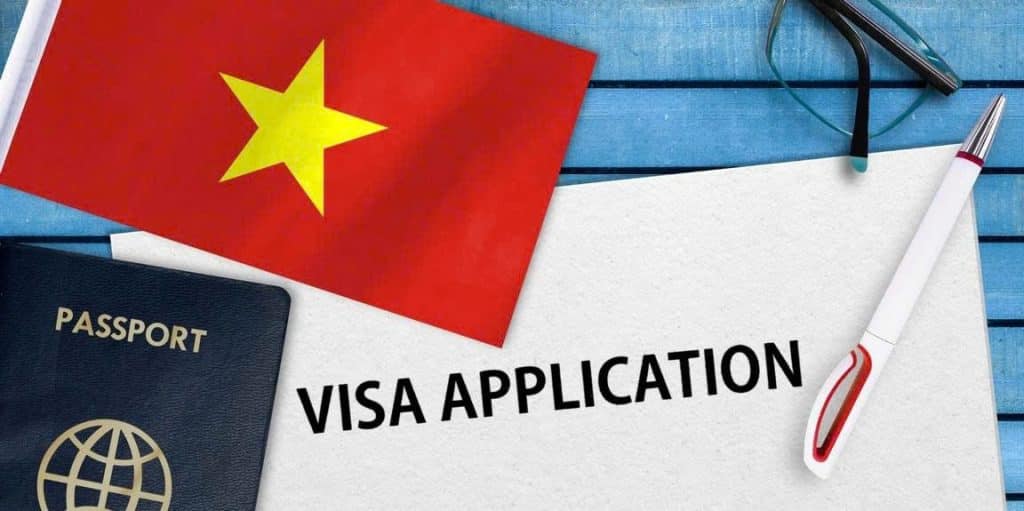
Most digital nomads enter Vietnam on a standard tourist visa and operate in a “visa grey area”—working for foreign companies while on a tourist entry.
- The E-Visa (Electronic Visa): The most common entry method. Currently allows stays of up to 90 days for citizens of many countries. You can apply online before travel.
- Visa on Arrival: Requires obtaining a pre-approval letter from a visa agent before flying, after which you get the stamp upon arrival.
- Visa Runs: For longer stays (e.g., 6-12 months), nomads must perform a “visa run” by exiting the country (to Thailand, Cambodia, or Laos) and immediately re-entering on a new visa. This is a common but tedious process.
- Business Visas (DN/LV/DL Type): These offer longer stays but require a legitimate business purpose or, ideally, sponsorship from a Vietnamese company. While more complicated, they offer a more stable, longer-term solution.
Crucial Tip: Always Verify
Visa policies in Vietnam can change quickly, especially regarding extensions and the length of a tourist stay. Always check the latest requirements from the official Vietnam Immigration Department or, better yet, consult with a reliable, well-reviewed visa agent in HCMC or Hanoi before and during your stay. Do not rely solely on forum advice.
6. Finding Accommodation and Settling In

Short-Term Strategy (The First Month)
- Use Booking Platforms: For the first few weeks, use platforms like Booking.com, Agoda (often better for Asia), or Airbnb for a hassle-free hotel, guesthouse, or short-term serviced apartment stay. This gives you a base to explore the city without commitment.
Long-Term Strategy (3+ Months)
The best deals are found locally and often require a 6-12 month commitment.
- Facebook Groups: This is the most effective way to find long-term rentals. Search for “Apartments for Rent [City Name]” or “Expats/Digital Nomads [City Name] Housing.” Landlords or agents frequently post photos and prices here.
- Real Estate Agents: Local agents are helpful, especially for finding modern condos in popular expatriate buildings. Be sure to clarify all fees and contract terms upfront.
- Popular Options:
- Serviced Apartments: Ideal for convenience, including cleaning, laundry, and security in the monthly price.
- Studio Apartments: A great balance of affordability and privacy.
- Shared Houses/Villas: A fun option for socializing, common in expat areas like Thảo Điền (HCMC) or Tay Ho (Hanoi).
7. Practical Transportation and Safety
Getting Around Vietnam

- Ride-Hailing is King: Grab and the local favorite Xanh SM (green electric vehicles) are indispensable for convenient, affordable, and fixed-price transport within cities. Always opt for the motorbike taxi option (GrabBike or Xanh SM Bike) for the fastest way to beat traffic.
- Motorbike Rental: For experienced riders, renting a motorbike ($50–$100/month) offers the ultimate freedom. Legal Requirement: An International Driving Permit (IDP) with a motorbike endorsement is legally required to ride in Vietnam. Be extremely cautious—traffic is chaotic and requires constant alertness.
- Inter-city: For long distances, the comfortable sleeper bus is cheap and efficient. The legendary Reunification Express train offers a scenic, albeit slower, journey along the coast.
Staying Safe & Healthy
- Traffic Caution: Pedestrians do not have the right of way. When crossing the road in Hanoi or HCMC, walk slowly and predictably—motorbikes will flow around you. Don’t stop abruptly.
- Minor Scams: Be aware of common tourist scams (inflated taxi fares, especially from airports; dishonest street vendors). Use Grab/Xanh SM for pricing transparency.
- Health Insurance: This is non-negotiable. Secure comprehensive travel and health insurance with international coverage (e.g., SafetyWing, World Nomads). For severe medical needs, Hanoi and HCMC have competent private international hospitals (like Vinmec or Family Medical Practice).
- Food Safety: When eating street food, look for stalls that are busy and have a high turnover of patrons—this ensures the food is fresh. Always drink bottled water.
8. Cultural Nuances and Local Etiquette

A successful life as a Digital Nomad in Vietnam requires a willingness to engage with and respect the local culture.
Language and Communication
- English: Widely spoken in tourist areas, major hotels, and by younger generations in HCMC and Hanoi.
- Vietnamese: Learning a few basic phrases (Xin chào – Hello; Cảm ơn – Thank you; Một ly cà phê – One coffee) will dramatically improve your daily interactions and is highly appreciated by locals.
Respect and Tipping
- Respect: Show respect to elders, religious sites (dress modestly, cover shoulders and knees), and the local culture. Do not criticize the government or its history.
- Tipping: Not traditionally expected for small services (like a street food vendor), but it is always appreciated for good service in mid-to-high-end restaurants, hotels, or by tour guides.
Bargaining and Shopping
- Bargaining: It is common and expected in local markets (chợ), souvenir shops, and for taxi fares (if not using an app). Start low, be friendly, and don’t push too hard. It is not common in supermarkets or modern fixed-price stores.
RELATED: The Essential Guide to Understanding Vietnamese Etiquette
9. Financial Management for the Digital Nomad in Vietnam

Managing your money smartly will maximize your budget.
- Currency: Vietnamese Dong (VND). Familiarize yourself with the denominations, especially the k (thousand) and m (million) abbreviations. Always count your change, as the currency has many zeroes.
- Cash is King (for small transactions): While Visa and Mastercard are accepted in mid-to-high-end places, cash is essential for street food, local markets, and small purchases.
- ATMs and Fees: Widely available. Be aware of your home bank’s foreign transaction fees and the local Vietnamese bank’s withdrawal fee (usually around $1–$3 per transaction). Withdraw large sums to minimize fees.
- Digital Wallets: MoMo and ZaloPay are the dominant mobile payment apps. While very popular locally, they typically require a local bank account, which is difficult for a short-term visitor to open.
- International Cards for Nomads: Cards that refund ATM fees (like Charles Schwab) or offer zero foreign transaction fees (like Revolut or Wise) are highly recommended.
10. Embracing the Digital Nomad Community

The social aspect is what makes the life of a Digital Nomad in Vietnam truly sustainable and enjoyable.
- Facebook Groups: This is the main social engine. Search for “Digital Nomads Ho Chi Minh City,” “Digital Nomads Hanoi,” or “Expats Da Nang”. These groups host job postings, housing listings, and, most importantly, social event announcements (weekly drinks, coworking days, weekend trips).
- Coworking Spaces: Naturally attract like-minded individuals and are great for impromptu networking.
- Meetup.com: Check for local digital nomad, expat, or specialized interest events (e.g., entrepreneur meetups, language exchanges).
- Local Cafes/Bars: Certain establishments in expat areas naturally become de-facto remote work hubs—simply show up with your laptop and you’re likely to meet someone new.
RELATED: Digital Nomads Cost of Living in Vietnam: Monthly Budget Guide
Vietnam offers an unparalleled experience for digital nomads seeking adventure, affordability, and a vibrant cultural immersion. The logistical challenges, primarily the need for careful visa planning, are significantly outweighed by the benefits of living and working in this dynamic country—from the unparalleled street food and the low cost of living to the warmth of the Vietnamese people and the supportive nomad community.
By leveraging the insights and practical tips in this guide, you’ll be well-prepared to make Vietnam your next thriving remote work destination. Pack your bags, charge your laptop, and get ready to discover why so many are calling this incredible nation home.


